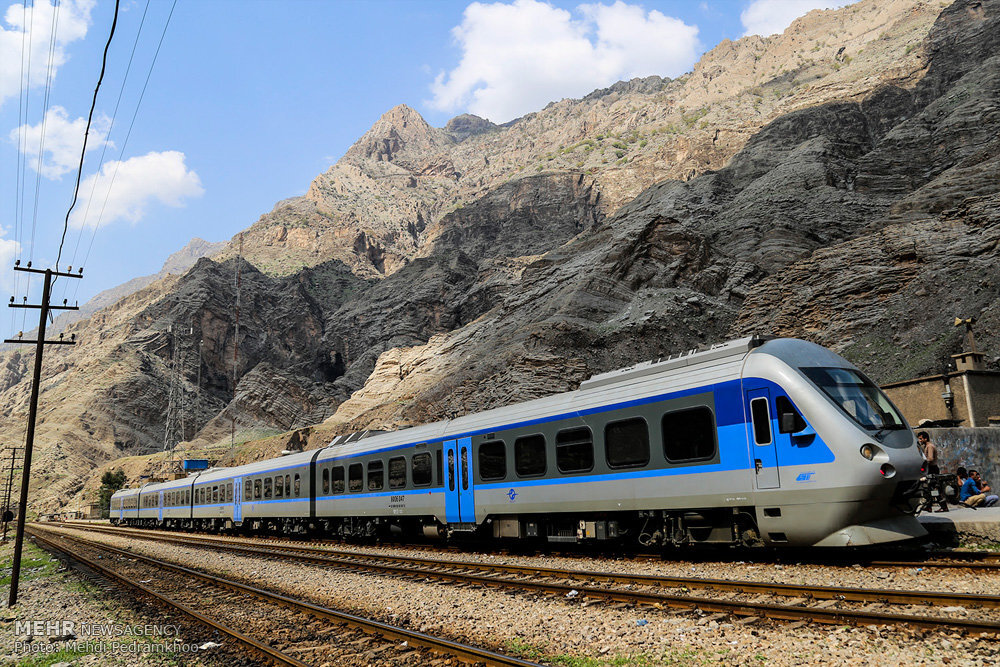Iran determined to become fully independent in railway industry

After the U.S. imposed a new round of sanctions on the Iranian economy, a national determination was formed inside Iran for empowering its domestic production to achieve self-reliance.
Since then, the national will for independence has become stronger and the Iranian industry has invigorated production in different sectors.
Railway is one of the sectors in which such status is outstanding, as self-reliance has been achieved in some major areas of this sector.
From domestic manufacturing of parts and equipment to rail tracks, wagons, and locomotives, self-reliance is now being witnessed in the railway sector.
In June 2018, the first domestically-manufactured rail tracks were handed over to the Islamic Republic of Iran Railways (known as RAI).
The consignment contained 500 tons of U33 rail tracks which were produced according to the latest global standards including engineering standards EN13674.
Mentioning the hand-over of the first domestically-manufactured rail tracks (known as National Rail) to the Islamic Republic of Iran Railways, Iranian Transport and Urban Development Minister Mohammad Eslami said, “Moving toward self-sufficiency in this sector is a must and delivery of the first cargo of the National Rail has been a big achievement in this regard.”
He underscored that the country would become a major rail track manufacturer in the region in near future.
Also speaking on the sidelines of the 20th edition of Iran’s International Exhibition of Building and Construction Industry (Iran ConFair 2020) in mid-September, the minister said, “Applying National Rail in the railway network is an honor for the country’s industrial sector.”
In terms of domestic manufacturing of wagons and locomotives, last year the railway fleet received 213 domestically-made wagons and locomotives in September, and 243 wagons and locomotives in December.
The current Iranian calendar year is named the year of “Surge in Production” by Leader of Islamic Revolution Seyed Ali Khamenei, and since the year start (March 20), the national railway fleet has constantly received new domestically-made locomotives and wagons.
At the first stage, which was on April 28, the fleet received 56 new domestically-made locomotives and wagons.
As reported, over 1.25 trillion rials (about $29.7 million) was invested by six domestic companies for the manufacturing of the mentioned wagons and locomotives.
As for the second stage, 88 wagons and locomotives were added to the fleet, while in the third round 65, and in the fourth stage 50 wagons and locomotives joined the fleet.
In total, since the beginning of the current year, 778 wagons and locomotives worth 12.7 trillion rials (over $302 million) have joined Iran’s railway fleet.
All such achievements prove that Iran is determined for complete self-reliance in the railway sector.
During a ceremony for inaugurating the permanent exhibition of self-reliance in the railway sector at the railway station of Tehran on Sunday, RAI Head Saeed Rasouli said, “We are determined to achieve real independence in the railway industry, and besides meeting the domestic need, we can have a strong presence in the regional market”.
The official also reiterated, “If we want to reach an ideal status in railway transportation, we should take some vast measures in this field.”
Addressing the same ceremony, the transport and urban development minister said, “Sanctions and threats cannot impede Iran’s development and progress, as there are many technical and financial capacities inside the country.”
The necessity of achieving self-reliance in the railway sector also comes under the spotlight when taking Iran’s determination for promoting its transit status into account.
During the Sunday inauguration ceremony, the RAI head said that by completing rail infrastructures, Iran would be able to access transit markets with over 35 million tons of annual capacity.
Rasouli underlined Iran’s geopolitical and strategic position which has turned the country into a vital gateway for regional and international trade and said: “We must make the most of this position and these capacities.”
Also, back in December 2019, the transport and urban development minister had said that the country is capable of boosting its capacity of transit to 50 million tons per year.
“We should make an essential improvement in our logistics power to gain our share of transit”, Eslami emphasized.
